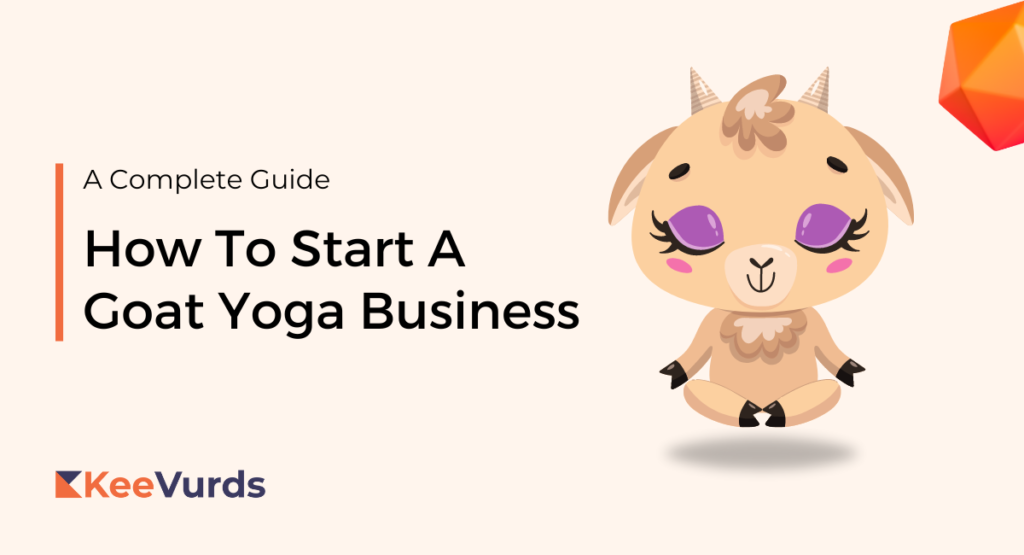The yoga industry in the United States is booming.
According to the Yoga Alliance Report 2022, a staggering 38.4 million Americans unrolled their mats in 2022, spending over $21 billion on classes, apparel, and accessories. This meteoric rise in popularity proves that people are craving innovative ways to unwind, de-stress, and improve their well-being.
But what if the downward dog just isn’t cutting it anymore?
What if you’re looking for a business idea that taps into the wellness trend while offering a unique twist? Look no further than the unexpected, yet undeniably delightful world of goat yoga.
Yes, you read that right. Goat yoga – the practice of performing yoga poses alongside friendly, playful goats – has exploded in popularity in recent years. This seemingly bizarre combination offers a surprisingly effective stress reliever, with the added cuteness factor of interacting with these curious creatures.
Studies have shown that interacting with animals can lower stress hormones, reduce anxiety, and even boost feelings of happiness.
But is goat yoga just a fad, or is there a bleating business opportunity waiting to be seized?
Here at KeeVurds, we believe the answer is a resounding “Baaa!” 😁
In this comprehensive guide, we’ll walk you through everything you need to know about starting your own goat yoga business, from finding the perfect herd to crafting an irresistible marketing strategy.
So, grab your mat, dust off your yoga pants, and get ready to transform your life (and maybe make a buck or two in the process).
What Is A Goat Yoga Business?
A goat yoga business combines the practice of yoga with the presence of goats. People participate in a regular yoga class, but with the added cuteness and amusement of having friendly goats around.
These goats might wander around the participants, cuddle up next to them during poses, or just provide a source of entertainment with their antics.
Here are some things to know about goat yoga businesses:
- Benefits: Proponents of goat yoga believe it offers stress relief and enjoyment beyond a regular yoga class. The interaction with animals is thought to boost mood and lower anxiety.
- Target Audience: Goat yoga is a popular activity for people who enjoy yoga and want a unique experience. It can also attract those who are curious about goats or looking for a fun social outing.
- Business Side: If you’re interested in starting a goat yoga business, there are important considerations like legalities, permits, insurance, acquiring goats, and finding a suitable location for the classes.
Setting Up A Goat Yoga Business In The USA
This guide will walk you through the steps for starting your goat yoga business in the USA, from conceptualization to operation, including name selection, branding, and more.
So, follow the steps:
1. Research and Planning
Before investing any money, start by researching the popularity and demand for goat yoga in your local area. You can look into any existing businesses offering similar experiences and identify what you can offer that’s unique.
Once the research is completed, you can develop a comprehensive business plan that outlines:
- your vision,
- target market,
- competitive analysis,
- financial projections,
- and marketing strategies.
This plan will be important for securing financing and guiding your business decisions.
💡Legal Considerations: Familiarize yourself with local zoning laws, business licenses, and permits required to operate a goat yoga business. You’ll also need to look into liability insurance to protect your business and participants.
Goat yoga isn’t generally illegal across the entire US, but it can be restricted in some ways:
- Health regulations: Some states, like New York, have shut down goat yoga due to concerns about animal-borne diseases spreading in places meant for exercise.
- Zoning laws: These laws dictate land use. There have been cases, like in Oregon, where farms couldn’t hold goat yoga events because their zoning only allowed activities related to traditional farming.
- Animal exhibition permits: Some locations might require permits for exhibiting animals, which could create hurdles for goat yoga businesses.
So, while the concept itself isn’t outlawed, it’s always best to check local regulations before attending or starting a goat yoga business.
2. Location
Your business location needs to be suitable for both yoga classes and goats. This could be a farm, a large backyard, or a rented outdoor space. Make sure the location is accessible and has adequate parking for the participants.
Once you find a perfect location, you can create a safe and comfortable environment for both the goats and your clients. This includes fencing, shelter for the goats, and a clean, flat area for yoga classes.
3. Selecting The Goats
For your business to thrive, choosing the right goats is one of the most important steps.
Here’s a guide to help you find the perfect herd to share your yoga space:
Friendly and Calm Dispositions
Your stars need to be gentle and comfortable around people. Breeds like Pygmy goats, Nigerian Dwarf goats, or Fainting goats (known for their momentary startled response, not actual fainting) are ideal choices.
Early socialization with humans and other animals from a young age is key – these goats will feel right at home interacting with yogis during class.
Size Matters
Full-grown goats can be quite large and will be hard to handle if you are just starting. Thus, you can consider miniature breeds that are easier for participants to interact with comfortably.
When it comes to age, young goats (around 6 months to 2 years old) tend to be playful and energetic, while older ones offer a calmer experience. Choose based on the experience you want to create – a playful and interactive atmosphere or a calmer, more meditative one.
Healthy from the Start
Partner with a reputable breeder or goat farm that prioritizes animal health. Up-to-date vaccinations are a must. Before welcoming your goats to yoga sessions, have them checked by a veterinarian to confirm they’re parasite-free and in excellent overall health.
Finding the Right Fit
Some breeders or goat farms specialize in raising goats specifically for yoga classes. Their expertise can be invaluable. Consider partnering with them for goat selection and ongoing guidance. Don’t forget the logistics – think about housing, transportation, and daily care needs for your herd.
Local Regulations
Research any local regulations regarding animal interaction in businesses. Obtaining any necessary permits or licenses ensures you’re operating smoothly and legally.
4. Name Selection and Branding
Choose a name that is memorable, easy to spell, and reflects the essence of your goat yoga business. Consider using puns or playful language to evoke a sense of fun and relaxation.
Also, you should develop a strong brand identity that includes a logo, color scheme, and a consistent tone of voice for all your communications. Your brand should convey the unique experience your goat yoga business offers and appeal to your target audience.
5. Marketing and Promotion
To promote your business, you will require a website with all the important details about your business and services. You can hire a team of website developers to create a professional website that showcases your offerings, schedule, pricing, and booking information. Include high-quality photos and testimonials to engage potential customers.
Once the website is ready, you can utilize social media platforms like Instagram, Facebook, and TikTok to attract your target audience to your website. By featuring adorable goats and happy yoga participants in your posts regularly, you can attract attention and build a community around your business.
To take your business to the next step, you can also Collaborate with local businesses, wellness centers, and community groups to promote your goat yoga classes. Offering free demo sessions can also help generate buzz.
6. Operations
Booking and Payment System: Implement an online booking and payment system to make it easy for clients to reserve their spots and for you to manage your classes.
Waivers and Safety: Ensure all participants sign a waiver before participating, acknowledging the risks involved with animal interaction and physical activity. Conduct a safety briefing before each class to minimize accidents.
Feedback and Improvement: Collect feedback from your clients to continuously improve your offerings. This can help you adjust your classes to better meet the needs and expectations of your participants.
7. Expansion and Diversification
As your goat yoga business grows, consider expanding your offerings. This could include advanced yoga classes, themed events, private sessions, or even expanding to include other animal-assisted wellness activities.
Starting a goat yoga business requires careful planning and dedication, but it can be incredibly fulfilling. By creating a unique and enjoyable experience, you can build a successful venture that brings joy and relaxation to your clients and a loving home for your goats.
Frequently Asked Questions About Goat Yoga Business
Below are some of the major questions that people usually ask related to the goat yoga business in the USA:
1. How many goats do I need for my Goat Yoga Business?
The ideal number of goats depends on the size of your yoga classes. Here’s a guideline:
- Small Classes (up to 10 people): Aim for 4-6 goats. Remember, goats are herd animals and need social interaction.
- Medium Classes (10-20 people): 8-12 goats would provide enough interaction for participants.
- Large Classes (over 20 people): You might need 15 or more goats to ensure a good goat-to-human ratio.
2. Do I need insurance for my Goat Yoga Business?
Absolutely. Liability insurance is essential to protect your business from potential lawsuits related to animal injuries or participant accidents. You can research insurance options specifically designed for agritourism or animal-interactive businesses.
3. How Much Does It Costs To Start A Goat Yoga Business?
Starting a goat yoga business can cost anywhere from $10,000 to $20,000 depending on your location, goat breed, and class size.
The biggest factors influencing cost are:
- Goats: Expect to pay $200 to $500 per goat, depending on breed and age.
- Insurance: Liability insurance is crucial and can range from $1000 to $3000 annually.
- Permits and Licenses: Budget $500 to $1000 for permits related to operating a farm or handling animals.
- Location: Rental costs for your yoga space can vary significantly depending on location. Urban areas will generally have higher rents than rural locations.
- Staff Salary: Wages for instructors and assistants will depend on your location and staffing needs. You may also need to factor in additional costs for cleaning staff or farmhands, depending on your operation.





